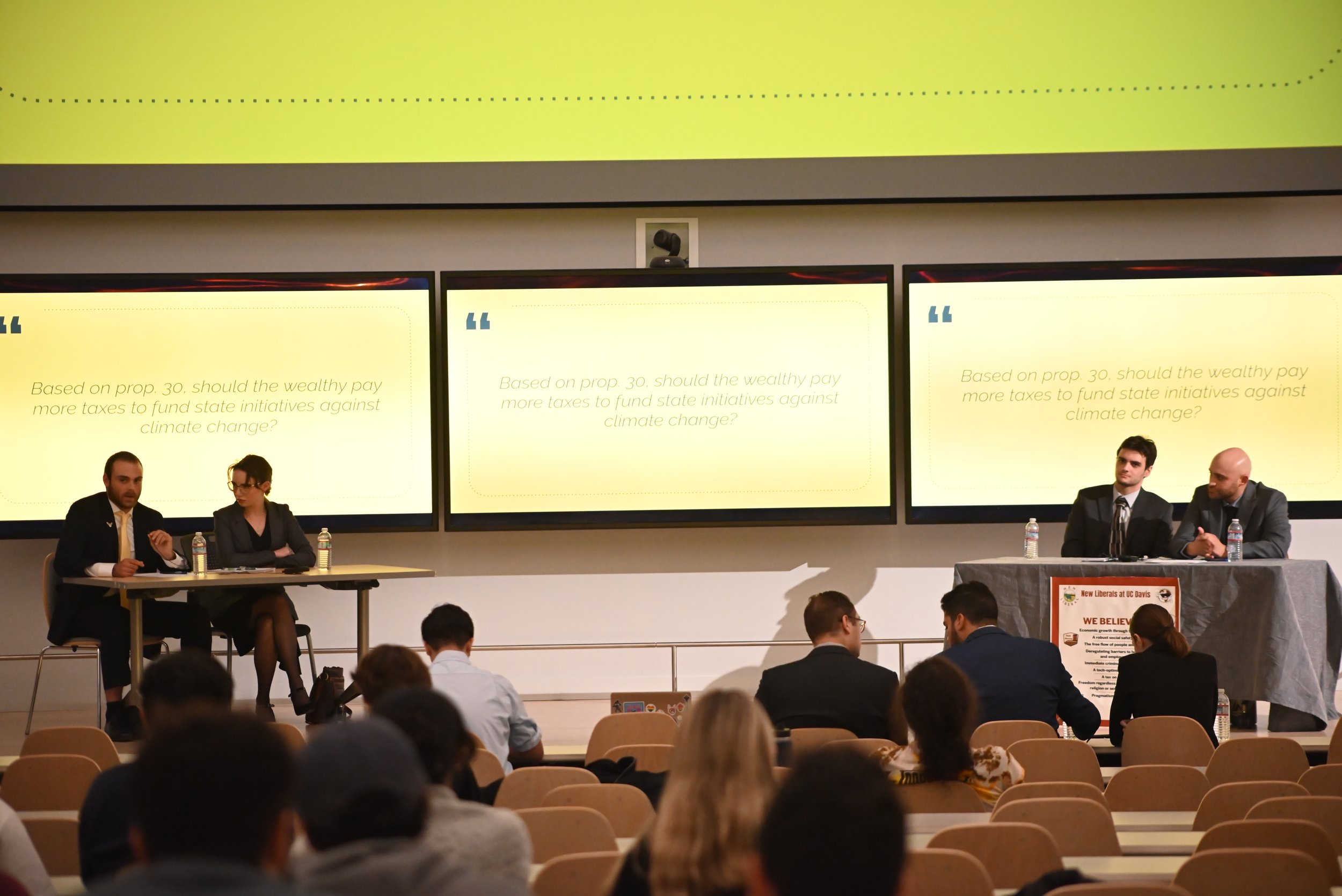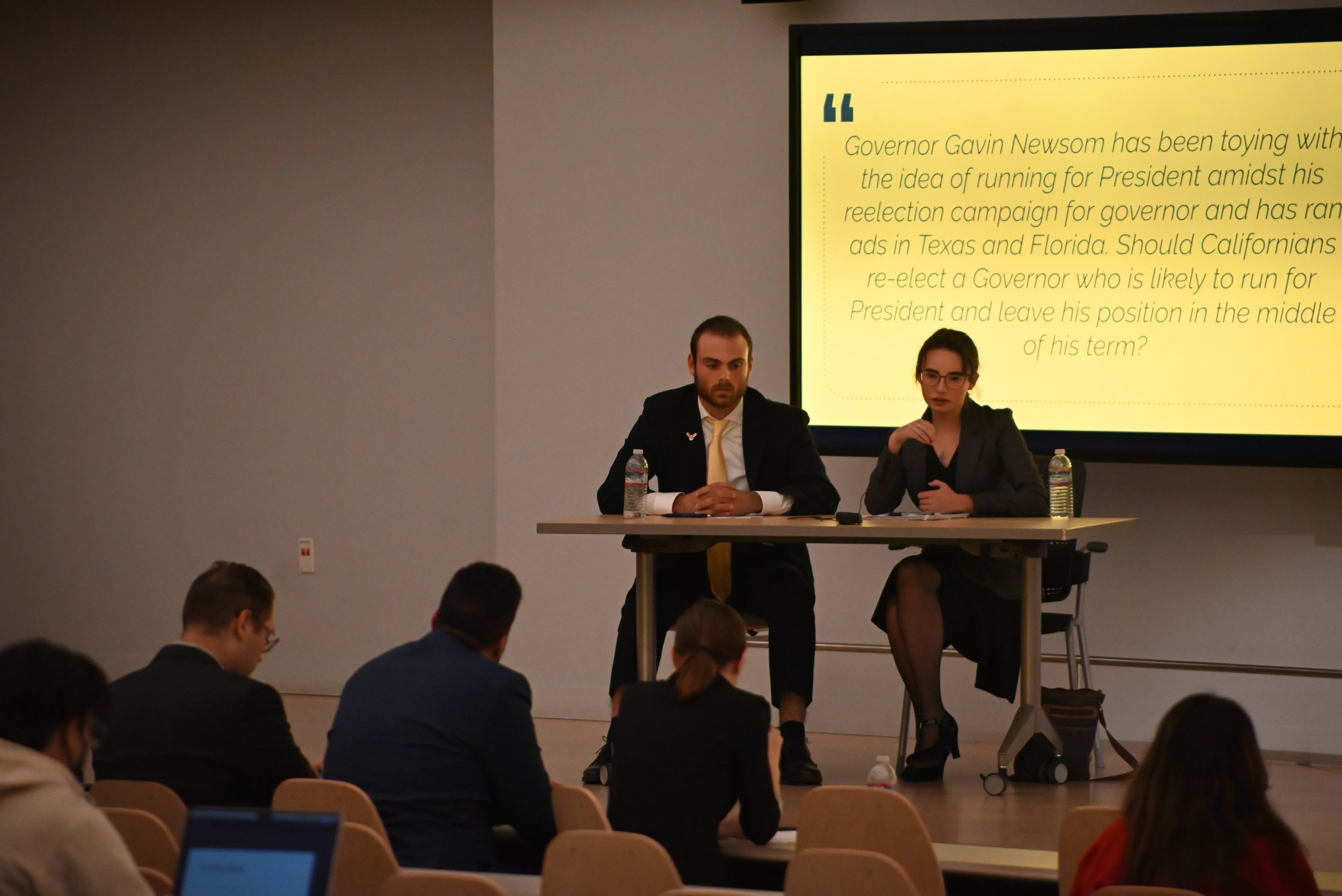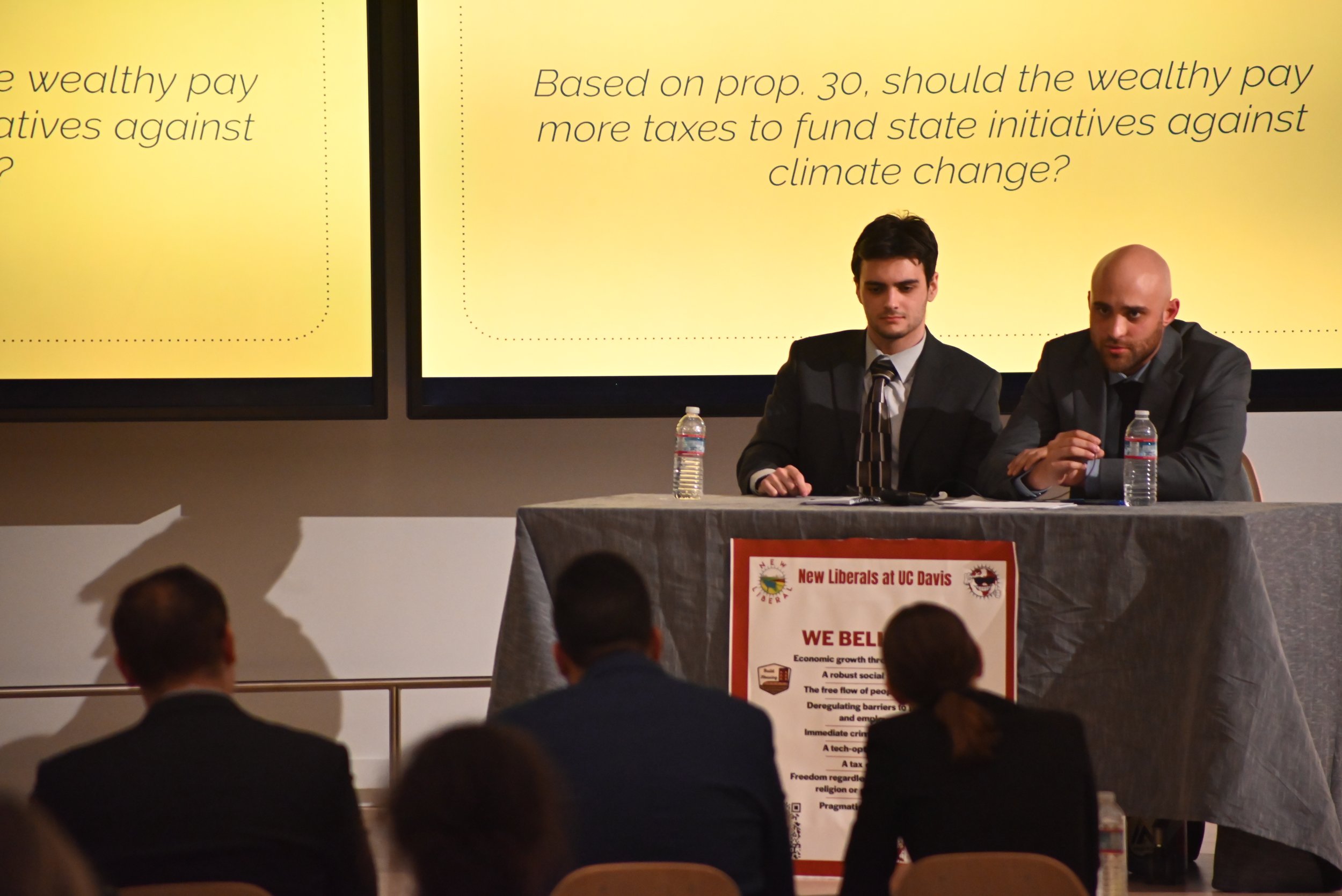The Importance of Public Debate In the Modern Era
From left to right, Davis College Republican Representatives Jim Fein and Elizabeth Correa, Davis Political Review Moderators Andy Essa, Nour Taha and Marie Schermeister, and New Liberals Club Representatives Johnny Taggart and Alejandro Valenzuela. Taken by Alec Gossage.
Written by Editor-in-Chief Andy Essa and Senior International Editor Nour Taha.
Edited by Associate International Editor Aidan Kato and Chief Copy Editor Abigail Loomis
Last Saturday, the Davis Political Review hosted a public debate between the Davis College Republicans and the New Liberals club. The event was the first of its kind in Davis where student panelists questioned other students with differing perspectives on topics ranging from freedom of speech, campus violence, foreign policy, and inflation while providing them with a platform to civilly discuss their different opinions. We would like to thank the New Liberals club and the Davis College Republicans for their participation in this debate. As a nonpartisan organization, we in the DPR understand the value of our free speech, and most importantly the duty we hold to protect it.
The cornerstone of American democracy lies in the ability to speak one’s mind without fear of being forced to conform to the majority’s opinion. That is why generations of immigrants have come to America, escaping the oppression felt in dozens of authoritarian regimes - to build a better life without the fear of retaliation. In an increasingly polarized society, debates and public discourse that should respect differences of opinion often devolve into violent riots, as exemplified in recent events, such as the Turning Point USA event in Davis last month. As a result, we, as the executive editorial board of the DPR, concluded that a student debate would be the perfect opportunity for the various political groups on campus to express their viewpoints to the general public in a moderated and safe environment.
MC Donia Ghaith giving the microphone to an audience member asking the delegates impromtu questions. Taken by Alec Gossage.
When reaching out to the Davis College Republicans and the New Liberals club we were met with absolute enthusiasm. Both organizations were excited to participate in such a debate, and to have a platform to discuss and civilly question one another’s political opinions. Unfortunately, it became clear throughout a multitude of conversations that the Davis College Democrats, the largest political organization on campus, were unwilling to have their opinions challenged in a public setting. While the DCD originally reached out to the Davis Political Review for editorial assistance and collaboration, they were quick to shy away from any public discourse that included other political organizations and conflicting perspectives. Instead, the DCD decided to prioritize what they described as ‘ground work.’
In reality, there is nothing more important than this type of ground work in the city of Davis that is still reeling from recent political violence and intolerance. This type of event is designed to showcase that groups of different political stances can come together to discuss their views is the perfect remedy, and shows that free speech and public debate is still strong in the city. Likewise, even the Democratic candidates that the DCD endorse, such as Congressman Mike Thompson, have encouraged the DCD to take part in such events. During a DCD meeting, Congressman Thompson emphasized to a DPR reporter the importance of such discourse in Davis, explaining that events like the DPR’s were extremely critical amidst such a consequential election, where each person has a responsibility to encourage public discourse in which we change the opinions of others while defending our own personal political values in a civil and constructive way.
New Liberal Representative Alejandro Valenzuela (second from right on table) answering moderator Nour Taha’s question (second from left) on the failures of California’s education system. Taken by Alec Gossage.
Even more shocking is the constant refusal from the Davis College Democrats to participate in bipartisan discourse for years prior to our event. Based on an anonymous source from within the DCD, the DCD has a formal policy preventing them from taking part in any sort of political discussion associated with right-leaning groups, such as the Davis College Republicans. The DCR has been trying for years to create a space for public discourse with the DCD. The DCR has made their stance clear, they want to encourage public debate and the respectful communication of ideas, and they want to put their ideas to the test, to see how they can be improved.
While naysayers may claim that debates are pure showmanship and do not put forward direct argumentation, it is a key tenet of our democracy to express and discuss conflicting opinions and actively engage in public discourse — i.e. debate. Debates are an essential part of making important daily decisions, such as asking your spouse where to eat, which condiment is better on a sandwich, and which ice cream flavor is best at the Davis Creamery. Debates help us not only understand our personal beliefs, but those of the people we disagree with. Proper debates are incredibly humanizing, as instead of viewing the opposite stance as some lesser thing held by people we are clearly better than, we can begin to understand not only the opinion, but the other person as well. By excluding themselves from all forms of public discourse, the DCD has weakened their stances within the local political sphere. After all, if you cannot argue your point of view to your opposition effectively, and be able to defend it, how can the average voter trust your confidence?
Davis College Republican Representative Elizabeth Correa (second from right on table) answering Marie Schermeister’s question (Third from right on moderator table) regarding Gavin Newsom’s potential presidential bid in 2024. Taken by Alec Gossage.
In one of UCD’s popular political science courses, taught by lecturer McCage Griffiths, he discusses how and why democratic states fall into authoritarianism, specifically regarding decreased political participation, including discussion. The actions of the DCD wholeheartedly reflect the beginning stages of democratic backsliding. By failing to participate in political discourse and not working with the other side, one has to ask, why? There is credibility that such an event could have gotten heated, and potentially out of hand. However, the live stream below proves how quite the opposite happened. If the DCD believes they cannot behave in a civil manner during such a debate, then there is ample reason to question their political credibility as a political organization. Ironically enough, across the country it was the Republicans who refused to debate Democrats, due to the intense partisanship and the belief of election deniability.
Debates are more than just two people arguing without coming to a resolution. While refusing to debate may not cause a direct collapse of American democracy, the lack thereof certainly is worse. Colby Galliher, Research Analyst and Project Coordinator at the Brookings Institution, explains that “In our hyper political world, how campaigns — and candidates — conduct themselves matters. They thus do democracy a service when they buck the trend and meet on the debate stage — a message they can champion as Americans fret over the future of the nation’s politics and governance.”
New Liberals Representative Alejandro Valenzuela( Second on right on table) answering Moderator Andy Essa’s question (first from left) regarding the implementation of Proposition 30. Taken by Alec Gossage.
It is frankly unacceptable in our democracy for any major political organization to fundamentaly refrain from participating in events with political counterparts. The nature of our democracy requires bipartisan communication, and working towards compromise for the common good of our country. When groups do not debate one another, what are the odds they would work together for infrastructure, taxes, climate change, or foreign policy? Public discourse events, such as the DPR debate last Saturday, are the only weapons that we can wield to decapitate the ugly head that partisan polarization has reared.
“ If liberty means anything at all, it means the right to tell people what they do not want to hear.” – George Orwell.
The link to the full livestream of the DPR debate can be found below:
https://www.youtube.com/watch?app=desktop&v=7DiUBr7QpGA





